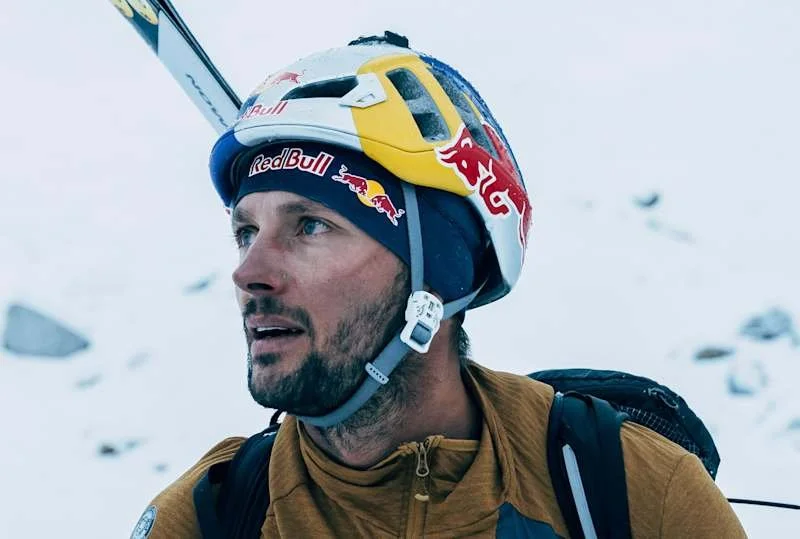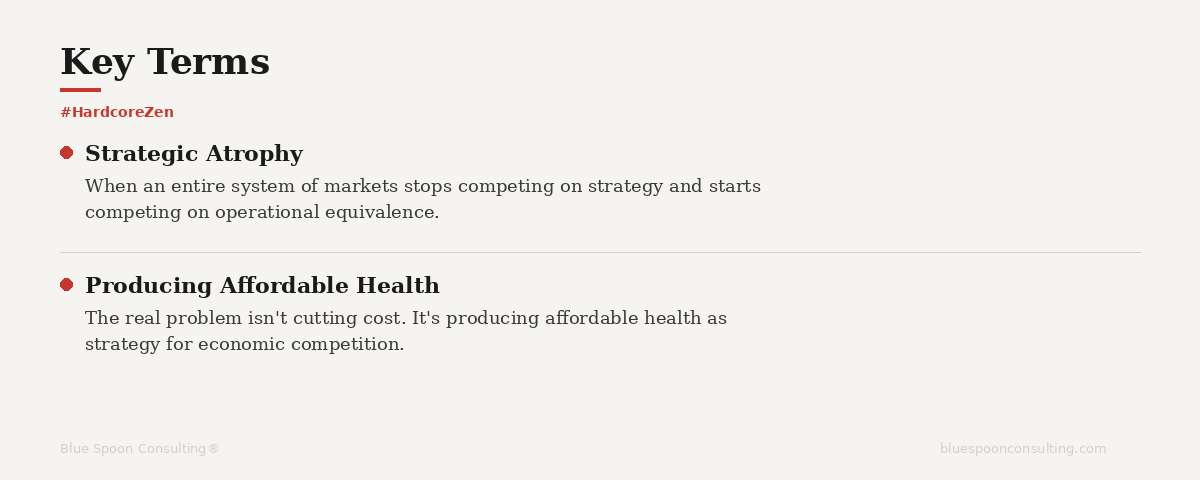The "Swagger" Thing at UnitedHealthcare
When Leaders Confuse Arrogance for Confidence
Summary: UnitedHealth Group's new CFO wants to restore the company's 'swagger.' The stock is down 45%. Insurance margins crashed from 5.6% to 2.1%. Optum is closing clinics and reverting to fee-for-service. $16 billion in cash flow has vanished. Swagger isn't the problem. The system is.
Andrzej Bargiel has confidence.
The Polish adventurer embraces a new level of courage, creating his own niche in the world of mountaineering and skiing. In 2023, he became the first person to ski down all four of Karakoram’s towering eight-thousanders: Broad Peak, K2, Gasherbrum I and Gasherbrum II.
Bargiel’s name is synonymous with pushing boundaries.
From ski competitions to high-mountain expeditions, he’s been on a relentless journey of breaking through every ceiling. In 2013, he launched his project, Hic Sunt Leones (meaning “here are the lions”) to prove that skiing the highest peaks in the world wasn’t just a dream. In 2018, he did the unimaginable: he became the first person to ski from the summit of K2, the second-highest mountain on Earth. “At the bottom, I was as happy as a child... I felt great relief and joy,” he recalls, remembering that historic descent. Since then, his list of accomplishments has only grown – skiing all four eight-thousanders in the Karakoram, as well as Manaslu and Lhotse – and tackling new challenges in the Andes and Alps.
Two months ago, Bargiel made history as the first person to climb Mount Everest and ski down it without the aid of bottled oxygen. The full 31-minute video of him descending from Everest’s summit back to Base Camp is harrowing stuff. Bargiel even skied the dreaded Khumbu Icefall — a feat that deserves its own place on the short list of insane outdoor accomplishments. When the New York Times published the news of Bargiel’s descent, my jaw dropped.
You can now watch Bargiel’s entire descent. Red Bull uploaded a 31-minute clip to YouTube, which was shot via a helmet-mounted camera and flying drones.
Ultimately, for Bargiel, true confidence in extreme environments is a blend of strategic planning, self-belief, and the wisdom to know when to proceed and when to wait for the right conditions.
“When a project is risky, we need to distance ourselves and stop assuming that we will make it very quick,” he explains in an interview with InsideHook. “Timing and patience are just as important as the push for success. And ultimately, success comes from blending strategic planning and relentless action. Everything I do is done with confidence. This is crucial in a situation like this.”
What Bargiel does takes real balls, understood here in the oldest, truest sense of the word: courage. UnitedHealthcare has balls too, but it’s a different kind.
Arrogance Isn’t Leadership
UnitedHealth Group CFO Wayne DeVeydt laid out a roadmap to improve the company’s financial performance during an interview at the UBS Global Healthcare Conference on Nov. 10.
Per Becker’s Payer Review reporting:
“Having competed against this organization for years, both as the CFO of Elevance and then on the board of Centene, the one thing that’s very clear to me is that the assets are as good as I thought they were,” Mr. DeVeydt said. “We want to show that we can get back to the swagger the company once had.”
UnitedHealth has been working to assure investor confidence over the last year as it faces financial headwinds related to rising medical costs and utilization, especially within its Medicare Advantage and Optum Health businesses. Part of the recalibration efforts have included several senior leadership changes, with Stephen Hemsley returning to the CEO role, Patrick Conway, MD, being named CEO of Optum, and Mr. DeVeydt becoming CFO in September.
The company is projecting a 10% medical cost trend for 2026, up from the 7.5% trend seen in 2025, reflecting the impact of evolving drug pricing, tariffs and AI-driven coding trends among providers. Within its ACA business, UnitedHealthcare is implementing a 25% rate increase in 2026 “across the board” and expects to lose two-thirds of its exchange membership due to the anticipated expiration of enhanced premium tax credits at the end of this year.
And yes, Optum Health is reverting back to legacy economics and modes of being, boldly going where healthcare has gone before, shifting some of its value-based care contracts back to fee-for-service. This is part of a broader strategy to restructure and simplify operations following its epic collapse, along with closing clinics and renegotiating contracts, all part of a desire to align with more “clinically oriented” models. Which is weird. How does a model "close clinics” and align with a “clinically-oriented” approach at the same time?
UnitedHealtcare is proving the seventh rule of systems thinking: every system operates most of the time in failure mode. Which is why they can never be “fixed”.
Neal Shah at Morningstar:
“UnitedHealth's stock has lost approximately 45% of its value in a year. Its insurance margins crashed from 5.6% to 2.1% in the third quarter. Optum Health - the company's provider arm - saw its margins plummet from 8.3% to 1% during the same period. And somewhere in all that wreckage, $16 billion disappeared. That's half of the company's forecasted cash flow - gone, apparently with no credible explanation. The company has spent about $118 billion over five years buying competitors and rolling most of them into Optum. There are now $165 billion in inter-company revenue flows between subsidiaries, making it impossible to tell where the real value is.”
My working theory:
We’re never going to crack the mad riddle of healthcare by mounting long attacks on each other, or by chasing operational “efficiency” in the hope it conjures shareholder value. That delivers what we have now: structural stalemate, static drift, innovation stagnation, multi-dimensional dysfunctionality, systemic performance declines, a celebration of short-term wins, a stunningly bad EBITDA from a $5 trillion investment.
Strategic atrophy is the norm, not the exception.
Searching for Swagger
Today’s leaders either don’t have the skills to navigate the tornado of chaos and complexity around them, can’t effect change within their own organizations, or are too afraid to make a mistake and fail. As we close out 2025, career collapse has become the operative ethic.
The era of ‘ectoplasmic generalities’ as the basis for executive content and communications is over. Ditto for the quick fix of the thing that’s not fixable. True leadership makes history.
“Cutting cost” isn’t the problem in the American Way of Healthcare.
The real problem is ‘producing affordable health’ as strategy for economic competition. This future comes to life through a unique industry narrative that pushes the frontier. It’s positioned on outcomes and roadmaps constructed around big market innovation. And the power and leverage to make that Strategic Rotation happen is in the hands of the employers, not the vendors, a category that includes UnitedHealthcare.
The thing needed across the board is a different brand of strategic imagination, better strategy stories able to articulate and propagate a frontier narrative, to lead through extreme environments. History is made by the bold. It takes leadership to redefine the limits of what’s possible.
If it’s “swagger” you’re after, be more like Bargiel and less like DeVeydt.
/ jgs
John G. Singer is the executive director of Blue Spoon, the global leader in positioning strategy at a system level. He works with organizations to design new market narratives and exit strategies from collapsing systems.
He is the author of When Burning Man Comes to Washington: A Field Manual for Riding Chaos, which introduces Hardcore Zen, a unique method for leading system-level change. His latest work, The Burning Man Index™, scores 27 institutions on their proximity to narrative collapse — the moment an organization's story stops matching the world it operates in.
To explore a Hardcore Zen whiteboard or arrange a guest lecture, email here.

